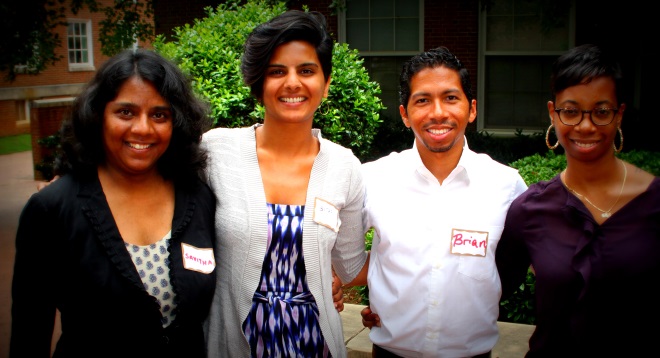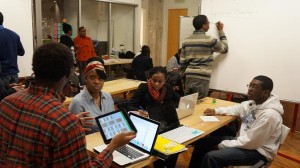By Christina Sturdivant
Leaders of the Minorities in Energy Initiative hosted the White House Forum on Minorities and Energy—the first event of its kind to recognize the program’s ambassadors and begin a series of national conversations focused on integrating more minorities into the STEM field, which has historically lacked diversity in its professions.
The Initiative was launched by the Department of Energy on September 24, 2013 to encourage members of underrepresented communities to pursue careers in energy.
Experts and leaders from the private sector, as well as officials from several government agencies comprise what Secretary of Energy Ernest Moniz, called a broad base of support and drive for a program in a hot industry.
And in such a place, “women and minorities are critical,” said Moniz.
Today, Hispanics, African-Americans, and American Indians make up 24 percent of the nation’s workforce, but only 9 percent are in STEM careers.
With an expectancy of millions of jobs in STEM becoming available in the next five years, addressing the issue of inclusion should be handled with urgent persistence, said Moniz.
In addition to engaging individuals, the initiative seeks to address the needs of underrepresented community organizations in the energy field and empower them to partake in the technical, procurement, engagement, workforce and energy literacy resources of the Department of Energy and the energy sector overall.
Among these organizations are academic institutions, which inevitably open the door to opportunity through successful educating and training of future STEM leaders.
During the event’s STEM Education and Workforce Development panel, Dr. John Wilson, President of Morehouse College, expressed his gratefulness to the Obama administration in shedding light on issues critical to energy efficiency and similar matters among an abundance of noise traversing today’s political arena.
“On our campus, we are stressing STEM education—we have to get our best brain power in these areas,” said Wilson, noting that Morehouse produces a substantial number of graduates in STEM disciplines each year.
Deputy Secretary of Energy, Daniel Poeman, recognized Hampton University President Dr. William Harvey as another HBCU champion of energy initiatives. Poeman said conversations with Harvey have led him to believe that Hampton University is well on its way to creating a more diverse STEM pipeline. Likewise, Poeman acknowledged the innovative approaches in STEM spewing from Nashville, Tennessee at Fisk University.
According to the National Science Foundation, “nine of the top ten baccalaureate institutions of African-American STEM doctorate recipients from 2006-2010 are HBCUs.”
“Minorities and minority communities are profoundly and sometimes unfairly affected by climate issues,” said Poeman. “The service that minorities have rendered in this nation for centuries is of great historical significance. Minorities have an incredible amount to give.”
Despite Poeman’s claims of HBCUs’ engagement in energy issues, some in the HBCU community are more skeptical of the efforts of HBCUs involvement in STEM initiatives.
Dr. Chad Womack, director of STEM Education Initiatives at the United Negro College Fund, said HBCUs are failing in connecting to the energy industry, specifically around innovation, tech development and the tech ecosystem.
“Ultimately our HBCUs should be nodes and hubs of innovation and entrepreneurship that drive innovation, commercialization and tech-entrepreneurship in energy, as well as, other tech-sectors,” said Womack.
Many colleges, including HBCUs, believes Womack, are deaf to the need for skills building and training, which is the number one qualification sought by corporations, regardless of race or gender. To fundamentally attend to the holes in training of students, HBCUs must transform, connect and align curriculum that have not been touched in over 30 years, Womack said.
Ken Tolson, Chairman of the HBCU STEM and Innovation Committee, believes that the HBCU defeat goes back further, to the signing of the Bayh-Dole Act in 1980.
Not since then, said Tolson, have HBCUs taken advantage of growing campuses and participated in the tech innovation economy life-cycle. While university presidents have been held back by brick and mortar principles, they are being defeated by the new virtual world existing in the 21st century.
“We are always playing catch up instead of getting ahead of the curve,” said Tolson. “So in essence, we have not been investing like we should in the future of our community.”
As minority influencers in the STEM field, both Womack and Tolson stand in solidarity with the mission of the initiative, but also agree that in order for HBCUs to contribute to the diversity pool, they must re-establish themselves as institutions that once shaped and transformed the American economy through scientists, inventors and innovators.
Source: HBCU Digest: http://hbcudigest.com/white-house-forum-sparks-conversation-on-hbcu-stem-efforts/


 College students will spend the weekend working toward building a web or mobile app. Students will form teams where they will brainstorm, design,build and launch, with prizes awarded to the best projects at the end of the weekend.
College students will spend the weekend working toward building a web or mobile app. Students will form teams where they will brainstorm, design,build and launch, with prizes awarded to the best projects at the end of the weekend.